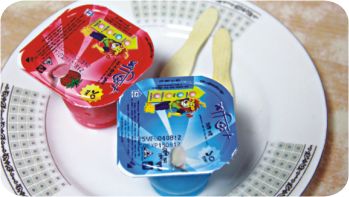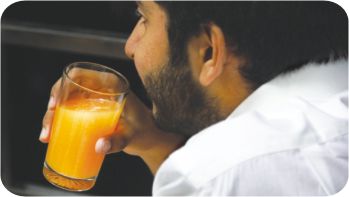Campus Edibles
Ramadan Tips: Be Fit, Be Healthy
Naziba Basher
Photos: Kazi Tahsin Agaz Apurbo
It is almost 6:30 in the evening. Everyone is waiting anxiously at the table, intently listening to the television that is set to BTV. People are grasping on to their glasses full of shorbot waiting to take their first sip of liquid through out the day. And as soon as the Azaan hits their ears, it's BAM! Everyone hurdles towards the soaked-in-oil peyajus and begunis and before they know it they are full upto their throats with more Ramadan delicacies like firni, chhola, jilapi and halim. Then begin the gastric problems, the uncomfortable feelings that eventually lead to fatigue and drowsiness.

Fruits such as Amra (hogplum)
| |
 |
| |
Cucumbers are 'in' this season |
Most people think Ramadan is the perfect time to lose some weight since they stay on an empty stomach for the whole day until it is time for Maghrib prayers. But what they do not realise is the amount of heavy and oily food intake just during the one hour or so of Iftaar is probably more than what their stomachs can handle. As students, it is a necessity to look after our health during this month since our health is all we have to make sure that running around from one class to the next does not get to us. Eating the clichéd bangali iftaar (ie the peyaju, beguni, halim etc), for one, is not going to help.
Try and keep it simple for iftaar. It is best to start off with dates. Not only is eating dates for iftaar considered Sunnat, but it is one of the best 'pick-me-up's ever. Dates give you an instant boost of energy that really keeps you going for the rest of the day. Bananas are also a good option for instant energy. And what better way to eat bananas than with cereal?
The best kind of cereal to eat during iftaar has to be, hands down, cheera. Cheera, soaked in milk, with some banana will not only give you the energy but will also cool down your stomach enough to be able to handle the other iftaar items. To all of those who think cheera is an odd kind of food that you never want near you, take our words for it.
| |
 |
| |
Shokti doi is a healthy option for iftaar. |
| |
 |
| |
Fruit juice will keep you properly hydrated. |
| |
 |
| |
A light snack like bread with omlette can be an ideal item for iftaar. |
It really, really helps! Cheera also tastes good with other things like sour or sweet yoghurt. 'Cheera and doi' (yoghurt) is a common delicacy in our country but most youngsters refuse to even give it a shot. Those who have, know how much it helps especially after being on an empty stomach the whole day. Apart from cereal, the best way to keep fit during the month of Ramadan is eating lots of fruits. The seasonal fruits now like peara (guava), amra (hogplum), pineapple and of course, apples, bananas and oranges are always loved and preferred.
But obviously, just some fruits and cereal will never satisfy you enough after fasting the whole day.
Noodles and soup are very good options to keep things simple yet fulfilling. Maggi Noodles are found in stores all around the country for just Tk 20 and is extremely easy to cook. To perk things up a little more, you can easily add some vegetable or protein like eggs or chicken (or even both!) and it will be quite the treat for your taste buds. Knorr and Maggi Soups are also readily available in stores for around Tk 30-40. Apart from these, some homemade bread with omelette or curries can be a good pick too.
As students, we always face the traffic on the roads a lot more than other people and also have to face the trouble of being too late for iftaar. For those of us who have to spend iftaar on the streets, there are some things you can carry in your bag to give you a healthy meal. Shokti doi is one of the most helpful things you can find in a store. They cost Tk 6 in rural areas and Tk 12 in urban areas which means they are an absolute delight at a cheap price. Shokti doi comes in three flavours-- plain, strawberry and mango. One cup will easily keep you happy if you couple it up with some fruits and some juice that you can carry in a bottle and voila! You have yourself a good, healthy meal on the streets.
Even though many believe that all that fried, heavy food we've mentioned above hold the essence of Ramadan in our country, the truth is you can make anything special if you have the spirit of the Holy month in yourself! Be fit, be healthy and you are bound to spend a very happy Ramadan.
| 